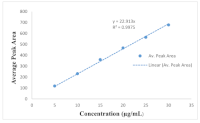Quality Assessment of Fifteen Brands of Paracetamol Injections Marketed in Lagos, Nigeria
DOI:
https://doi.org/10.51412/psnnjp.2024.27Keywords:
Paracetamol injection, sterility test, quality, assay of active ingredient, NigeriaAbstract
Background: Paracetamol injection is a widely used medication for the management of pain and fever in healthcare settings. Ensuring the quality and safety of pharmaceutical products is essential to protect public health, so there is need to investigate the quality of these Pharmaceutical preparations in Lagos, Nigerian drug market in compliance with international standards and guidelines.
Method: Fifteen brands of paracetamol injections were sourced from registered pharmacies in Lagos. The sampled products were subjected to a comprehensive quality assessment using standard protocols, including testing for the presence of specified indicator pathogens using compendial procedures like sterility testing and assessment of active pharmaceutical ingredient (API) content
through high-performance liquid chromatography (HPLC).
Results: Results from the study indicated that 86.67 % of the paracetamol injection samples have the Active Pharmaceutical Ingredient (API) content within the acceptable limit of the United States Pharmacopoeia (USP) 2018, but 13.33 % of the paracetamol injection samples were found to be above the maximum acceptable limit. The sterility test results showed that none of the paracetamol injections samples recorded microbial load above the limit of USP.
Conclusion: The findings of this study highlight potential quality issues in the paracetamol injection products marketed in Lagos, Nigeria. Further investigations and continuous monitoring by regulatory authorities are recommended to ensure the consistent supply of safe and effective paracetamol injection formulations to healthcare providers and patients in Lagos and beyond.
References
Teklu L, Adugna E, Ashenef A (2014) Quality Evaluation of Paracetamol Tablets Obtained From the Common Shops (Kiosks) In Addis Ababa, Ethiopia. International Journal of Pharmaceutical Sciences and Research 5(8): 3502-10. doi: 10.13040/IJPSR.0975-8232.5 (8).3502-10.
Mosharraf, Z (2012) Determination of the Quality Control Parameters of Paracetamol Tablets in Bangladesh Pharma Market.[Google Scholar]
Kar A, Amin MN, Hossain MS, Mukul MEH, Rashed MSU, Ibrahim M (2015) Quality analysis of different marketed brands of paracetamol available in Bangladesh. International Current Pharmaceutical Journal 4(9): 432 – 435. Doi: 10.3329/icpj.v4i9.24473
Salisu I, Muazu S, Sabi'u J, Bello S (2017) Assessment of the quality of paracetamol tablet brands sold in Katsina Metropolis Nigeria. MAYFEB Journal of Chemistry and Chemical Engineering - ISSN 2560-693X Vol 2 - Pages 1-10
Attaran A, Barry D, Basheer S, Bate R, Benton D, Chauvin J, Garrett L, Kickbusch I, Kohler JC, Midha K, Newton PN, Nishtar S, Orhii P, McKee M (2012) How to achieve international action on falsified and substandard medicines. BMJ. 345:e7381. doi: 10.1136/bmj.e7381
Eraj A, Ayub M (2015) Quality analysis of different brands of Acetaminophen available in the market. International Journal of Innovative Pharmaceutical Sciences and Research 3 (10):1457–1462. [Google Scholar]
Sahle, SB, Ayane, AT, Wabe, NT (2012). Comparative quality evaluation of paracetamol tablet marketed in Somali region of Ethiopia. International Journal of Pharmaceutical Sciences and Research, 3(2), 545. http://dx.doi.org/10.13040/IJPSR.0975-8232.3(2).545-50
Kibwage IO (2008) Counterfeiting of Drugs and the Necessity of Quality Control Systems in Developing Countries. An invited lecture Delivered at the Interdisciplinary Courses on Development and Cultures at the Invitation of CADES, Katholieke Universiteit Leuven February 26. http://hdl.handle.net/11295/52064
Shankar P, Partha P, Shenoy N (2002) Self-medication and non-doctor prescription practices in Pokhara valley, Western Nepal: a questionnaire-based study. BMC Family Practice 3(1):1–7. doi: 10.1186/1471-2296-3-17 [PMC free article ] [ PubMed ] [ CrossRef ] [ Google Scholar]
Okumura J, Wakai S, Umenai T (2002) Drug utilisation and self-medication in rural communities in Vietnam. Social Science & Medicine 54(12):1875–1886. doi: 10.1016/S0277-9536(01)00155-1 [PubMed] [CrossRef] [Google Scholar]
World Health Organization. (2010). Counterfeit medical products. Sixty-Third world assembly. 22nd April. A63/23.
Olaniyi AA, Babalola CP, Oladehinde FO,Adegoke AO (2001) Towards Better Quality Assurance of Drugs. Proceedings of 4th National Workshop, Department of Pharmaceutical Chemistry, University of Ibadan. pp 59-60.
Remington (2001) the Science and Practice of Pharmacy, 20th ed.; Troy, D.B., Ed.; Lippincott Williams & Wilkins: Philadelphia, pp 473-474.
Blackstone EA, Fuhr JP Jr, Pociask S (2014) The health and economic effects of counterfeit drugs. American Health & Drug Benefits 7 (4):216-24.
Banker GS (2002) Drug Products: Their role in the treatment of disease, their quality and their status and future as drug-delivery systems In GS Banker,CT Rhodes (Eds) Modern pharmaceutics. New York: Marcel Dekker, Inc; 1-21. PMID: 24389146
International Conference on Harmonisation ICH (1997). Guideline on the Validation of Analytical Procedure: Methodology; Availbility. The food and drug administration published this guideline on May 19; (62) 27464 - 27467 (62 FR 27463).
United States Pharmacopeia (USP) (2018). US Pharmacopeia National Formulary, USP 41 NF 36. US Pharmacopeia Convention, United BookvPress Inc. Rockville, Baltimore, MD.

Downloads
Views | PDF Downloads:
647
/ 210
Published
How to Cite
Issue
Section
License
Copyright (c) 2024 The Nigerian Journal of Pharmacy

This work is licensed under a Creative Commons Attribution-NonCommercial 4.0 International License.


